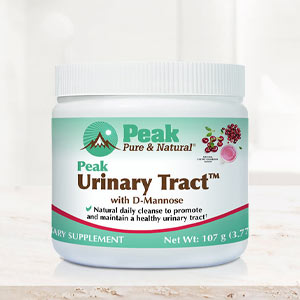Get Easy Health Digest™ in your inbox and don’t miss a thing when you subscribe today. Plus, get the free bonus report, Mother Nature’s Tips, Tricks and Remedies for Cholesterol, Blood Pressure & Blood Sugar as my way of saying welcome to the community!
13 tips to keep you from fretting about wetting

It can be embarrassing and uncomfortable to discuss bladder health. But it shouldn’t be, since it’s something that affects us all as we grow older.
As we age, the elastic tissue of the bladder can become tough and less stretchy, leading to a bladder that doesn’t hold as much urine as before. That means we’re running to the bathroom more often than we used to.
Also, the bladder wall and pelvic floor muscles often begin to weaken, making it harder to fully empty your bladder — or worse, causing urinary incontinence (UI).
This type of leakage isn’t an uncommon problem, especially for older women. While roughly 17 percent of American women ages 20 and older suffer from UI, that number skyrockets to 38 percent of women ages 60 and up, or a little over 1 in 3 women.
While there’s nothing you can do about getting older, there are some steps you can take to try to preserve as much of your bladder health as possible…
Tips for a healthy bladder
- Don’t wait to go. Trying to hold urine in for too long can weaken your bladder muscles and lead to a urinary infection. Make sure you urinate at least once every 3 to 4 hours.
- Relax and take your time. If you rush when you urinate, you may not fully empty your bladder, a situation that can lead to infection. You may even want to try what is known as double voiding, where you stand up after urinating, and then sit down again to completely empty your bladder. And women, you need to sit on the toilet seat, since hovering over it may make it hard to relax the muscles around the bladder, which you need to do to fully empty it.
- Wipe front to back. This step is most important after a bowel movement, but regardless, women should always wipe from front to back to keep gut bacteria from getting into the urethra (urinary tract) and causing infection.
- Urinate shortly after sex. This goes for women and men since sexual activity can move bacteria from the bowel or vagina to the opening of the urethra.
- Do Kegel exercises. These pelvic floor muscle exercises can help with bladder help in several ways. They can help hold urine in the bladder, keeping you from leaking urine. And by strengthening the muscles that help empty the bladder, they can help you avoid infection. And guess what? Kegels help men too in numerous ways!
- Wear cotton underwear and loose-fitting clothes. Wearing loose, cotton clothing helps keep the area around the urethra dry, while wearing tight-fitting pants and nylon underwear can trap moisture and help bacteria grow.
- Maintain a healthy weight. Overweight people have a higher risk of UI.
- Exercise regularly. Physical activity can help prevent bladder problems as well as support healthy weight management.
- Watch what you eat and drink. Some foods and drinks, including sodas, alcohol, artificial sweeteners, spicy foods, citrus fruits and juices and tomato-based foods, can make bladder problems worse. Caffeinated drinks like coffee and tea can also irritate the bladder and increase the frequent or urgent need to urinate.
- Drink enough fluids (especially water). How much water you need varies based on your size, activity level, health conditions and the climate you live in. A good rule of thumb is to drink enough fluids so you need to urinate every few hours. However, it’s best to discuss your fluid needs with your doctor if you have a pre-existing health condition like kidney failure or heart disease. Remember cranberry juice is great for hydration and for helping keep UTIs away.
- Avoid constipation. Allowing too much stool to build up in the colon puts pressure on the bladder and keeps it from expanding. You can help prevent constipation by eating more fruits and vegetables, drinking enough water and staying physically active. If you still need help, try natural helpers to make “going” easier.
- If you smoke, quit. Bladder problems are more common in smokers, and smoking also increases the risk of bladder cancer.
- Check your medications. Some medications could make bladder leakage more likely, such as medications that help you sleep or relax.
Supplements to try
If you’re already experiencing mild bladder issues, you may want to try adding these natural supplements to your daily routine:
- Pumpkin seed extract. Research has shown pumpkin seed extract can have a positive effect on bladder symptoms, with one study showing decreased daytime and nighttime frequency and decreased urgency.
- Kohki tea. This sweet tea has high levels of antioxidants and has demonstrated a protective effect on bladder function.
- Phytoestrogens. Some studies have found this natural estrogen compound found in foods like soy, sesame seeds, lentils, oats and berries to be connected with improved pelvic floor muscles.
Editor’s note: Did you know that when you take your body from acid to alkaline you can boost your energy, lose weight, soothe digestion, avoid illness and achieve wellness? Click here to discover The Alkaline Secret to Ultimate Vitality and revive your life today!
Source:
15 Tips To Keep Your Bladder Healthy — National Institute on Aging














